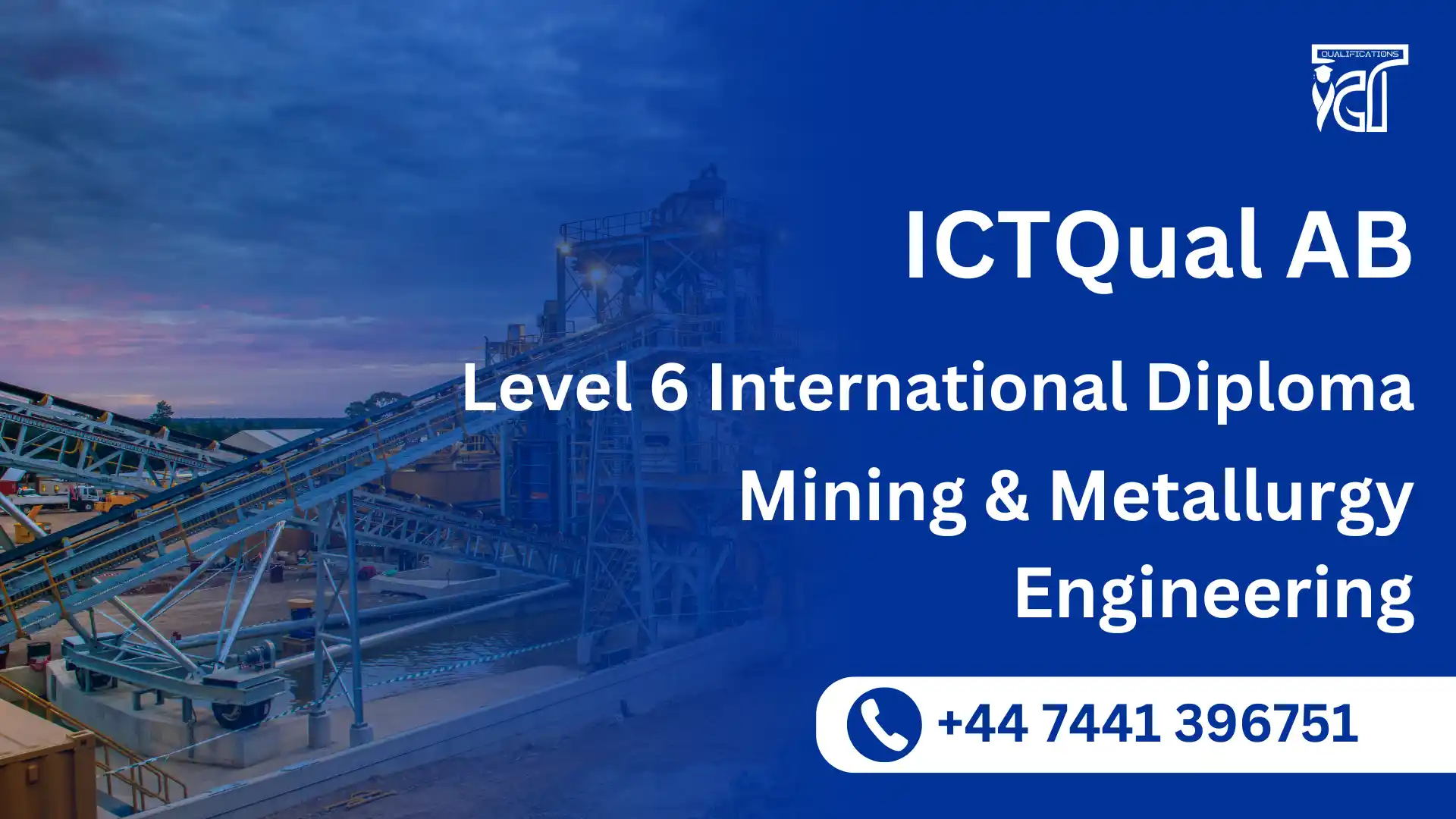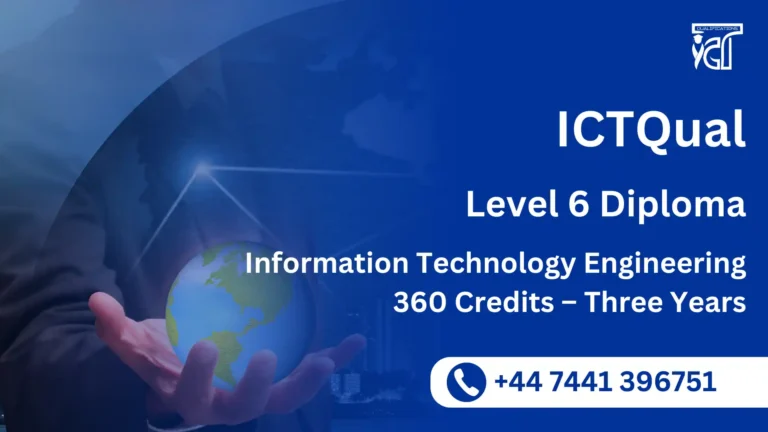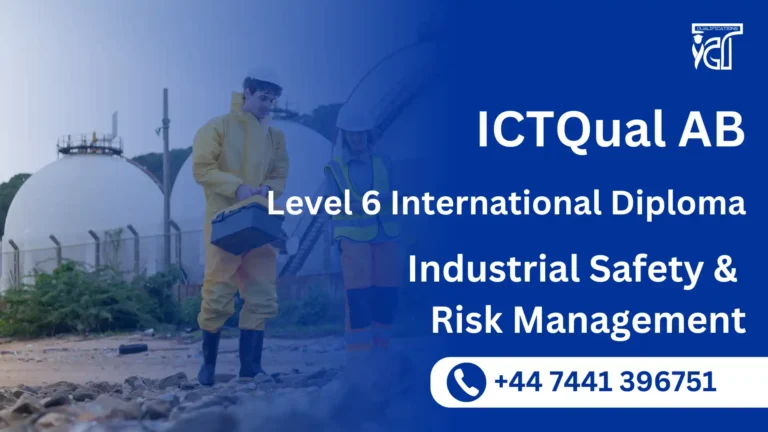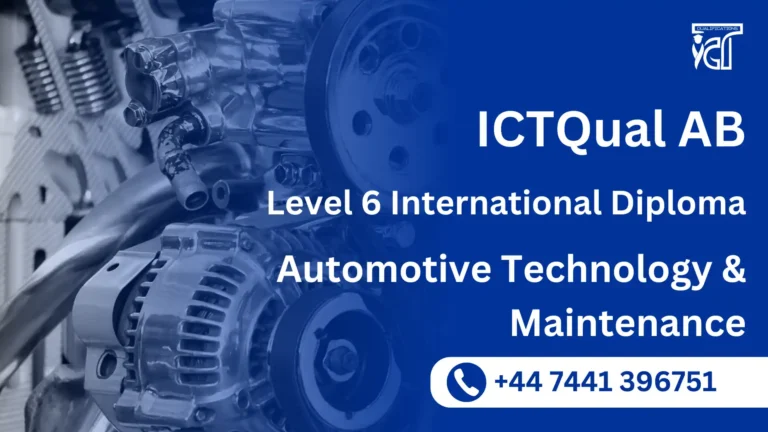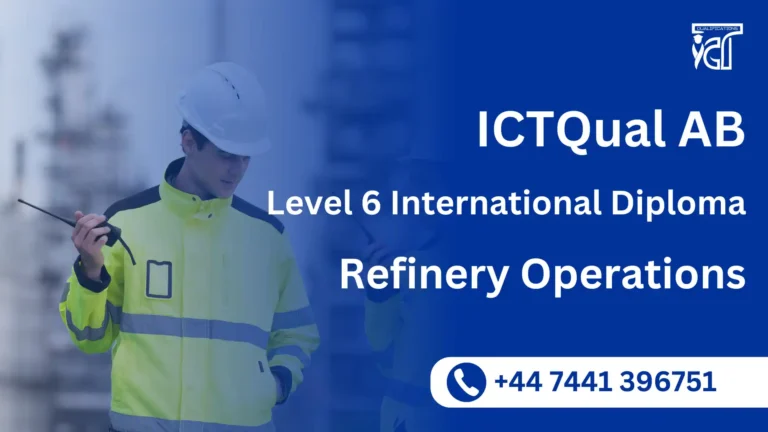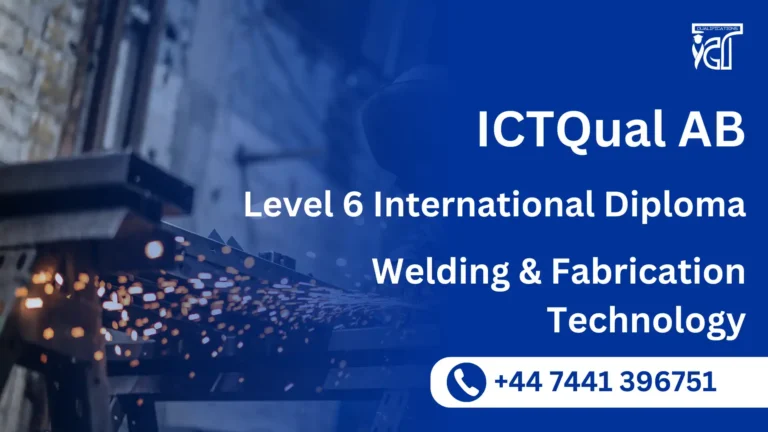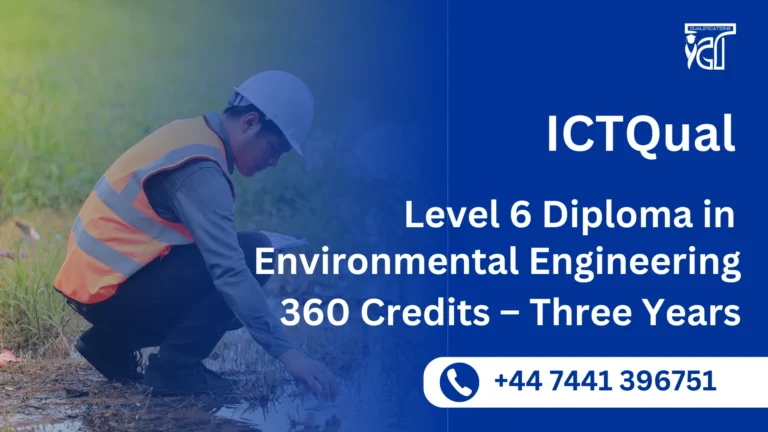The ICTQual AB Level 6 International Diploma in Mining & Metallurgy Engineering is an advanced three-year programme designed to prepare learners for high-demand roles within the global mining, minerals, and metallurgy sectors. Structured around a comprehensive 360-credit framework, this diploma equips learners with the technical expertise, analytical skills, and practical knowledge needed to meet the challenges of modern resource extraction and metal processing industries.
ICTQual AB Level 6 International Diploma in Mining & Metallurgy Engineering is ideal for fresh learners seeking to establish a strong foundation in mining and metallurgy, as well as experienced professionals aiming to enhance their technical abilities or progress into supervisory and managerial positions. The course covers critical areas such as mineral exploration, extraction techniques, metallurgical processes, safety management, environmental responsibility, and the use of modern engineering technologies.
By completing the ICTQual AB Level 6 International Diploma in Mining & Metallurgy Engineering, learners develop the capability to analyse complex mining operations, optimise metallurgical workflows, and implement innovative solutions that improve efficiency and sustainability. The curriculum has been carefully designed to reflect global industry standards, ensuring graduates are ready to succeed in diverse markets and challenging industrial environments.
Key benefits of this diploma include gaining industry-relevant expertise, strengthening problem-solving and decision-making skills, and enhancing global employability. Learners will be positioned for opportunities in mining companies, metallurgical plants, environmental consultancies, and engineering firms worldwide. Additionally, the qualification provides a clear pathway to higher academic studies or specialised professional certifications in related engineering fields.
This future-focused diploma empowers learners to contribute to the advancement of mining and metallurgy while achieving long-term career growth and international recognition in a vital and evolving industry.
ICTQual AB Level 6 International Diploma in Mining & Metallurgy Engineering
This qualification, the ICTQual AB Level 6 International Diploma in Mining & Metallurgy Engineering, consists of 36 mandatory units.
Year 1 – Foundation in Mining & Metallurgy Engineering
- Principles of Mining and Metallurgy Engineering
- Engineering Mathematics
- Fundamentals of Mechanical and Electrical Engineering
- Materials Science and Metallurgy
- Engineering Drawing and Computer-Aided Design (CAD)
- Introduction to Mining Geology and Mineralogy
- Basics of Mining Operations and Techniques
- Fundamentals of Ore Processing and Metallurgical Methods
- Health, Safety, and Environmental Practices in Mining
- Introduction to Mining Equipment and Machinery
- Communication and Technical Report Writing
- Introduction to Project Management in Engineering
Year 2 – Intermediate Studies in Mining & Metallurgy Engineering
- Mining Methods and Mine Planning
- Mineral Processing and Extractive Metallurgy
- Rock Mechanics and Geotechnical Engineering
- Advanced Materials and Metallurgical Analysis
- Industrial Automation and Control Systems in Mining
- Mine Surveying and Geomatics Applications
- Industrial Maintenance and Reliability in Mining Operations
- Sustainable Mining Practices and Environmental Management
- Applied Research Methods in Mining and Metallurgy
- Mining Economics and Cost Control
- Project Planning and Mine Operations Management
- Health, Safety, and Risk Management in Metallurgy
Year 3 – Advanced Studies in Mining & Metallurgy Engineering
- Advanced Mining Techniques and Underground Operations
- Advanced Metallurgical Processes and Simulation
- Mineral Resource Evaluation and Optimisation
- Mine Ventilation and Environmental Control Systems
- Smart Mining Technologies and Industry 4.0 Applications
- Robotics and Automation in Mining and Metallurgy
- Cyber-Physical Systems and IoT in Mining Operations
- Professional Ethics and Sustainability in Mining Engineering
- Innovation and Entrepreneurship in Mining & Metallurgy
- Infrastructure and Facility Planning for Mining Projects
- Advanced Research and Analytical Techniques in Metallurgy
- Final Year Major Project (Capstone Project)
Learning Outcomes for the ICTQual AB Level 6 International Diploma in Mining & Metallurgy Engineering:
Year 1 – Foundation in Mining & Metallurgy Engineering
Principles of Mining and Metallurgy Engineering
- Understand fundamental concepts in mining & metallurgy engineering processes.
- Analyse extraction, processing, and material handling methods.
- Demonstrate knowledge of mining and metallurgy terminology and industry standards.
Engineering Mathematics
- Apply algebra, calculus, and statistics to mining and metallurgical problems.
- Use mathematical models to interpret engineering systems.
- Develop problem-solving and analytical skills for technical applications.
Fundamentals of Mechanical and Electrical Engineering
- Understand mechanical and electrical principles relevant to mining machinery and equipment.
- Analyse basic circuits, power systems, and mechanical operations.
- Apply theoretical knowledge to simple engineering scenarios.
Materials Science and Metallurgy
- Identify types of metals and alloys used in mining and metallurgy.
- Understand material properties, structure-performance relationships, and testing methods.
- Select appropriate materials for engineering and metallurgical applications.
Engineering Drawing and Computer-Aided Design (CAD)
- Interpret technical drawings and industry standards.
- Develop 2D and 3D models using CAD software.
- Apply geometric tolerancing and dimensioning principles.
Introduction to Mining Geology and Mineralogy
- Identify rock types, minerals, and ore deposits.
- Understand geological formation and mineral distribution.
- Apply geological concepts to mining exploration and planning.
Basics of Mining Operations and Techniques
- Understand surface and underground mining methods.
- Analyse mining workflows, equipment use, and safety considerations.
- Demonstrate practical knowledge of ore extraction techniques.
Fundamentals of Ore Processing and Metallurgical Methods
- Apply principles of crushing, grinding, and mineral separation.
- Understand metallurgical processes for metal extraction.
- Evaluate efficiency and sustainability of processing methods.
Health, Safety, and Environmental Practices in Mining
- Identify workplace hazards and implement control measures.
- Apply health, safety, and environmental regulations.
- Promote sustainable mining practices.
Introduction to Mining Equipment and Machinery
- Understand types, functions, and operation of mining machinery.
- Evaluate equipment selection and performance.
- Apply basic maintenance and safety practices.
Communication and Technical Report Writing
- Develop clear technical communication and reporting skills.
- Structure professional engineering reports and documentation.
- Apply correct referencing and industry communication standards.
Introduction to Project Management in Engineering
- Understand project planning, scheduling, and resource allocation.
- Apply basic project management tools such as Gantt charts and critical path analysis.
- Analyse risks and manage project deliverables effectively.
Year 2 – Intermediate Studies in Mining & Metallurgy Engineering
Mining Methods and Mine Planning
- Analyse different mining methods for efficiency and safety.
- Develop mine plans including layouts, schedules, and resource allocation.
- Apply planning tools to optimise operations.
Mineral Processing and Extractive Metallurgy
- Implement advanced mineral separation and refining techniques.
- Analyse metallurgical processes to maximise recovery.
- Evaluate process efficiency and environmental impact.
Rock Mechanics and Geotechnical Engineering
- Assess rock properties, stability, and stress distribution.
- Apply geotechnical principles to mine design and excavation safety.
- Analyse slope stability and ground support requirements.
Advanced Materials and Metallurgical Analysis
- Investigate advanced metal alloys and metallurgical techniques.
- Analyse structural and thermal properties of metals.
- Apply testing methods to ensure quality and performance.
Industrial Automation and Control Systems in Mining
- Understand automation principles and control systems for mining operations.
- Program and monitor PLC-based systems.
- Apply digital monitoring for process efficiency and safety.
Mine Surveying and Geomatics Applications
- Conduct surveys using traditional and digital methods.
- Apply GIS and geomatics in mine planning.
- Analyse spatial data for operational optimisation.
Industrial Maintenance and Reliability in Mining Operations
- Apply preventive and predictive maintenance strategies.
- Analyse equipment reliability and implement condition monitoring.
- Improve operational efficiency through maintenance planning.
Sustainable Mining Practices and Environmental Management
- Implement sustainable practices in mining operations.
- Assess environmental impact and compliance with regulations.
- Promote resource efficiency and ecological responsibility.
Applied Research Methods in Mining and Metallurgy
- Develop research proposals and methodologies.
- Analyse qualitative and quantitative data.
- Present findings in technical and academic formats.
Mining Economics and Cost Control
- Analyse financial aspects of mining operations.
- Apply budgeting, cost estimation, and optimisation techniques.
- Evaluate economic feasibility of mining projects.
Project Planning and Mine Operations Management
- Plan and manage mining projects effectively.
- Apply scheduling, resource allocation, and risk management techniques.
- Monitor operational performance and productivity.
Health, Safety, and Risk Management in Metallurgy
- Apply safety and risk assessment protocols.
- Identify hazards in metallurgical operations and implement controls.
- Promote a culture of safety and regulatory compliance.
Year 3 – Advanced Studies in Mining & Metallurgy Engineering
Advanced Mining Techniques and Underground Operations
- Analyse complex underground mining methods.
- Implement best practices for safety, efficiency, and resource optimisation.
- Solve technical challenges in deep mining operations.
Advanced Metallurgical Processes and Simulation
- Apply simulation techniques to Mining & Metallurgy Engineering operations.
- Analyse complex processing systems for efficiency and sustainability.
- Optimise metallurgical workflows and production quality.
Mineral Resource Evaluation and Optimisation
- Conduct resource estimation and feasibility studies.
- Apply modelling techniques to optimise extraction.
- Evaluate economic and technical viability of mineral projects.
Mine Ventilation and Environmental Control Systems
- Design and analyse ventilation systems for underground operations.
- Implement environmental control and monitoring solutions.
- Ensure safety, air quality, and regulatory compliance.
Smart Mining Technologies and Industry 4.0 Applications
- Integrate IoT, automation, and digital monitoring in mining.
- Apply Industry 4.0 technologies for operational optimisation.
- Evaluate data-driven solutions for mining efficiency.
Robotics and Automation in Mining and Metallurgy
- Understand robotics applications in extraction and processing.
- Implement automated systems for operational safety and productivity.
- Evaluate performance of robotic solutions in mining environments.
Cyber-Physical Systems and IoT in Mining Operations
- Integrate digital sensors and networked systems in mining processes.
- Analyse operational data for efficiency and predictive maintenance.
- Apply cyber-physical systems to modern mining operations.
Professional Ethics and Sustainability in Mining Engineering
- Understand ethical responsibilities of mining engineers.
- Apply sustainability frameworks in design and operations.
- Evaluate social and environmental impacts of mining projects.
Innovation and Entrepreneurship in Mining & Metallurgy
- Develop entrepreneurial skills for the mining sector.
- Innovate technologies and processes for industrial applications.
- Create business strategies for mining and metallurgical ventures.
Infrastructure and Facility Planning for Mining Projects
- Plan and design mining facilities and supporting infrastructure.
- Apply principles of efficiency, safety, and environmental sustainability.
- Evaluate cost, logistics, and operational requirements.
Advanced Research and Analytical Techniques in Metallurgy
- Conduct complex metallurgical experiments and analyses.
- Apply computational and laboratory techniques to process optimisation.
- Present findings in professional reports and technical publications.
Final Year Major Project (Capstone Project)
- Undertake independent research or applied engineering project.
- Integrate knowledge from mining and metallurgy disciplines.
- Present results through professional reports and technical presentations.
Completing this diploma offers learners a robust combination of advanced technical knowledge, practical engineering skills, and global industry relevance. It prepares learners to meet the demands of the mining and metallurgy sectors, where innovation, safety, and environmental responsibility are critical. Whether starting a new career or seeking professional growth, this programme equips learners with the expertise to handle complex projects, supervise operations, and lead teams in challenging industrial environments. The three-year, 360-credit structure ensures a comprehensive education, giving learners the competitive edge needed to excel in both local and international markets.
1. Industry-Relevant Expertise
- Master advanced mining techniques, mineral extraction processes, and metallurgical operations.
- Learn modern engineering technologies and practices aligned with global standards.
- Gain in-depth knowledge of environmental sustainability and safety protocols.
- Develop problem-solving and analytical skills for complex industrial challenges.
- Understand economic and operational aspects of large-scale mining projects.
2. Enhanced Career Opportunities
- Qualify for roles in mining companies, metallurgical plants, environmental consultancies, and engineering firms.
- Prepare for supervisory, managerial, or specialist positions in resource extraction and metal processing.
- Strengthen employability across high-demand sectors worldwide.
- Access opportunities in regions rich in natural resources and industrial development.
- Increase earning potential through advanced professional expertise.
3. Practical and Theoretical Balance
- Combine classroom learning with real-world, hands-on applications.
- Apply theoretical knowledge to mining and metallurgical challenges.
- Gain confidence to manage large-scale engineering projects.
- Develop practical skills essential for fieldwork and industrial operations.
- Build competencies immediately applicable to global workplaces.
4. Pathway to Higher Learning and Leadership
- Progress to Level 7 or postgraduate studies in engineering or resource management.
- Pursue specialised professional certifications in mining and metallurgy.
- Strengthen leadership and project management capabilities.
- Position yourself for strategic roles within international organisations.
- Establish a foundation for long-term career growth and innovation in the sector.
This diploma is tailored for a diverse group of learners who are passionate about advancing their knowledge and skills in mining and metallurgy. It is designed to support both those entering the industry for the first time and professionals aiming to progress into senior or specialised roles within the global mining and metals sectors.
1. Fresh Learners and Career Starters
- Individuals eager to begin a career in mining, minerals, or metallurgical engineering.
- Learners seeking a comprehensive qualification to establish a strong technical foundation.
- Those interested in gaining both theoretical knowledge and practical skills relevant to the industry.
- Candidates looking for a globally recognised programme to secure entry-level positions.
- Learners motivated by opportunities in high-demand, resource-rich regions worldwide.
2. Experienced Industry Professionals
- Professionals already working in mining, metallurgy, or related engineering fields.
- Individuals aiming to enhance their qualifications for supervisory, managerial, or technical specialist positions.
- Skilled workers seeking to align their expertise with modern technologies and international standards.
- Those looking to expand their project management and leadership capabilities.
- Learners aspiring to handle complex industrial challenges or transition to consultancy roles.
3. Career Changers and International Learners
- Professionals from other engineering or technical backgrounds considering a shift into mining and metallurgy.
- Learners seeking to improve their global employability and mobility in high-growth industries.
- Individuals interested in contributing to innovative, sustainable resource extraction methods.
- Candidates eager to explore opportunities in emerging and established markets worldwide.
- Learners committed to long-term professional development and industry impact.
The ICTQual AB Level 6 International Diploma in Mining & Metallurgy Engineering equips learners with the knowledge, skills, and credentials to advance academically, professionally, and globally. Graduates can pursue multiple pathways to enhance their careers and expertise within the mining and metallurgy industries.
1. Higher Academic Pathways
- Progress to Level 7 or postgraduate programmes in mining engineering, metallurgy, or resource management.
- Pursue advanced research opportunities or specialisations in mineral processing or sustainable extraction.
- Strengthen academic credentials for future doctoral studies.
2. Specialist Certifications
- Obtain professional certifications in advanced mining technologies and metallurgical processes.
- Gain credentials in safety management, environmental sustainability, or industrial project planning.
- Build specialist expertise aligned with evolving global industry standards.
3. Senior Career Roles
- Qualify for supervisory, managerial, or consultant positions in mining companies and metallurgical plants.
- Lead complex projects within engineering, extraction, and metal processing operations.
- Increase earning potential through advanced responsibilities and leadership roles.
4. Global Employment Opportunities
- Access roles in resource-rich regions and international industrial markets.
- Strengthen employability in high-demand sectors worldwide.
- Contribute to innovative and sustainable mining and metallurgy solutions globally.
5. Entrepreneurial and Industry Innovation
- Establish or expand businesses in mining services or metallurgical operations.
- Develop engineering consultancy ventures within the global resource sector.
- Drive innovation and sustainability initiatives within mining and metallurgy industries.
Entry Requirements
To ensure learners are prepared for the academic and technical standards of this advanced qualification, the following entry requirements apply:
1. Minimum Age
- Learners must be 18 years or older at the time of enrolment.
2. Educational Background
- A Level 5 qualification or equivalent diploma in mining, metallurgy, engineering, or a closely related technical field is preferred.
- Candidates with a strong secondary education background and relevant technical knowledge may also be considered.
3. Experience
- Route for Experienced Professionals: At least five to six years of verifiable work experience in mining, metallurgy, or related engineering industries may allow direct entry.
- Route for Fresh Learners: Candidates without significant industry experience can enrol but may need to complete additional preparatory modules or assignments to build foundational knowledge.
4. Language Proficiency
- Learners should demonstrate proficiency in English, both written and spoken, to understand course content and assessments.
- An IELTS score of 5.5 (or an equivalent qualification) is recommended for non-native English speakers.
These criteria ensure that both fresh learners and experienced professionals can successfully engage with the three-year, 360-credit programme and fully benefit from its comprehensive curriculum.
Register Now
Qualification Process
Qualification Process for the ICTQual AB Level 6 International Diploma in Mining & Metallurgy Engineering
- Self-Assessment:
Begin by evaluating your eligibility to ensure you meet the qualification requirements, including work experience, knowledge, and language proficiency. - Registration:
Complete your registration by submitting the required documents, including a scanned copy of a valid ID, and paying the registration fee. - Induction:
An assessor will conduct an induction to confirm your eligibility for the course and explain the evidence requirements. If you do not meet the criteria, your registration will be cancelled, and the fee will be refunded. - Assignments & Evidence Submission:
Provide all assignments and the necessary evidence based on the assessment criteria outlined in the course. If you are unsure of the required evidence, consult with the assessor for guidance on the type and nature of evidence needed. - Feedback and Revision:
The assessor will review your submitted evidence and provide feedback. Evidence that meets the criteria will be marked as “Criteria Met,” while any gaps will be identified. You will be asked to revise and resubmit if needed. - Competence Evidence:
Submit final evidence demonstrating that all learning outcomes have been met. This evidence will be marked as “Criteria Met” by the assessor once it is satisfactory. - Internal Quality Assurance (IQA):
The Internal Quality Assurance Verifier (IQA) will review your evidence to ensure consistency, quality, and compliance with standards. - External Verification:
The IQA will submit your portfolio to ICTQUAL AB External Quality Assurance Verifiers (EQA) for final confirmation. The EQA may contact you directly to verify the authenticity of your evidence. - Certification:
Upon successful completion of all checks, ICTQUAL AB will issue your official certificate, confirming that you have attained the ICTQual AB Level 6 International Diploma in Mining & Metallurgy Engineering.

